
Species
A selection of species found in North Carolina.


Brown Snake
Scientific Name: Storeria dekayi
Photo Credits: JD Wilson
The Brown Snake can be found in forests under logs and rocks. It is light brown with gray and reddish-brown hues and a row of dark spots on its sides. The snake eats snails, slugs and earthworms and is non-venomous. Brown snakes have 4-25 offspring every summer.



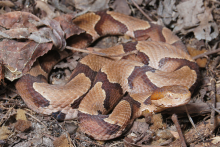
Copperhead
Scientific Name: Agkistrodon contortrix
Classification: Nongame
Abundance: Statewide
Photo Credits: Ian Deery
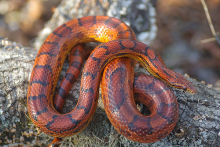
Corn Snake
Scientific Name: Elaphe guttata (Pantherophis guttatus)
Classification: Nongame
Abundance: Most common in the southeastern Coastal Plain
Photo Credits: Jeff Hall


Eastern Coral Snake
Scientific Name: Micrurus fulvius
Classification: Nongame; state listed as Endangered
Photo Credits: Jeff Hall
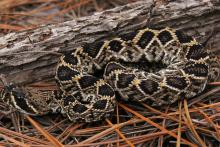
Eastern Diamondback Rattlesnake
Scientific Name: Crotalus adamanteus
Classification: State Listed as Endangered
Photo Credits: Ian Deery
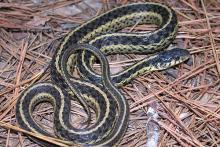
Eastern Garter Snake
Scientific Name: Thamnophis sirtalis sirtalis
Classification: Nongame
Abundance: Common throughout the state
Photo Credits: JD Wilson
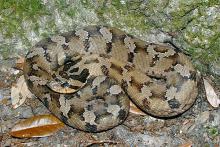
Eastern Hognose Snake
Scientific Name: Heterodon platirhinos
Photo Credits: Brad Moon
Usually brown or gray with dark brown blotches, the Eastern Hognose Snake has an upturned nose to dig for toads. They are non-venomous with enlarged teeth for swallowing. The snake, when threatened, will play dead by opening its mouth and rolling on its back.

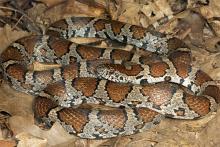
Eastern Milksnake
Scientific Name: Lampropeltis triangulum triangulum
Photo Credits: Todd Pierson
Living on wooded slopes, the Eastern Milksnake is usually gray or brown with reddish blotches on its back. They eat small snakes, lizards, and mice and are non-venomous.The Eastern Milksnake is usually found hiding under large stones.
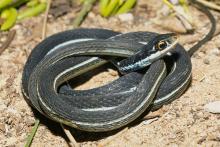
Eastern Ribbon Snake
Scientific Name: Thamnophis sauritus
Photo Credits: Richard Barlett
Found near canals, streams, ponds and marshes, the Eastern Ribbon Snake is fast-moving. It eats small frogs and salamanders and is non-venomous. Brown with three light stripes, the ribbon snake is active during the day and a great swimmer.
